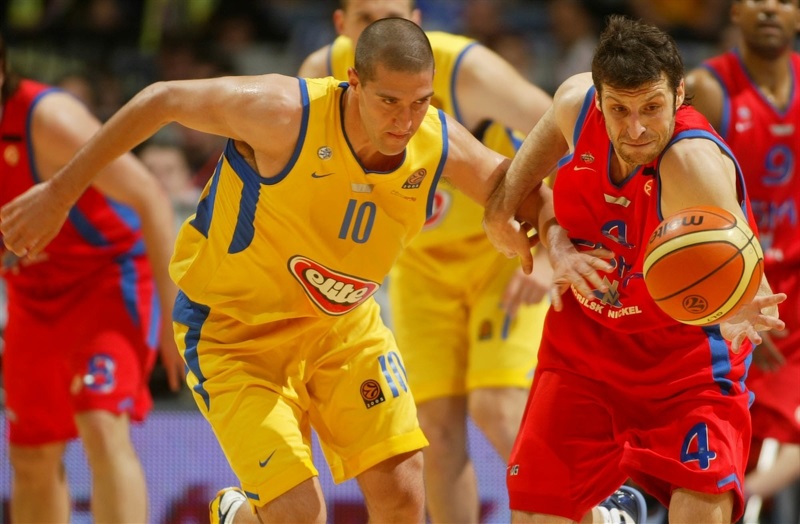In a match in which Tel Aviv’s Maccabi started out as a clear favourite due to recent history – champions in the last two editions – potential and support from their fans (almost 10,000 Maccabees fans populated the stands of the Sazka Arena), CSKA Moscow have once again become European champions, 35 years after the conquest of their last continental entorchado. The Russian team put an end to Maccabi’s hegemony by winning 73-69, in a very intense match almost always controlled by the team coached by Messina. His great defence, which asphyxiated the great Israeli stars, and the talent and opportunism of the enormous Theo Papaloukas (MVP of the Final Four) and David Vanterpool, turned a balance that Maccabi strove to balance until the end.
In this way, the millionaire (in transfers) Russian team has put an end to its curse in the Final Four of the Euroleague, a round it had reached during the last four years but in which it had always fallen in the semifinals. One of the main architects of this success is Italian coach Ettore Messina, who has instilled in his men a winning mentality and a great defensive ability. On the losing side, Maccabi are just one step away from making history, having won their third successive Euroleague would have equalled the record of the legendary Jugoplastika and the historic ASK Riga. The Tel Aviv outfit did not offer the same fantasy semi-final game against Tau Ceramica and were constantly on the defensive spider’s web of CSKA Moscow, who caught the big yellow stars. Neither Vujčić, Parker nor Baston lived up to expectations, unable to break through the Russian wall. Not even Solomon, who scored 20 unreal points and commanded a hasty and erratic attack.
After Maccabi’s semi-final display against Tau Ceramica, few bet on CSKA in the final. From the start, however, the Muscovites were in control of the game, despite a 7-0 opening-day deficit from the Israeli side. Ettore Messina’s time-out was the prelude to another 7-0 draw, this time in favour of CSKA, who balanced the score (7-7, min. 6). The key to this reaction was a defensive adjustment introduced by Messina, especially with the entry into the track of luxury «reserve» Theo Papaloukas and the work in the area of Aleksej Savrasenko and Belgian Tomas van den Spiegel. At eight minutes CSKA was placed for the first time ahead on the scoreboard (12-11), and although at the end of the first quarter was reached with a tie at 18, the superiority of Moscow, based on its suffocating defense, began to be evident.
CSKA applied a new twist to their defence at the start of the second quarter, and Maccabi’s attack began to thicken worryingly. Proof of this is that Anthony Parker, the Euroleague MVP in the Regular Round, had to wait until the 12th minute to score his first two points. In the face of Pini Gershon’s despair, the Moscow advantage increased during this period to ten points (35-25, min. 19), although Maccabi reacted with a 0-5 partial that allowed them to reduce the differences at half-time (35-30).
After the restart, David Vanterpool assumed the offensive responsibility at CSKA, which led his team to break the ten-point lead (42-31 and 44-33, min. 23). Maccabi was unable to overcome Moscow’s strong defence, but in the 26th minute he found a path to penetration after Matjaž Smodiš’s third personal foul. Messina was forced to replace the Slovenian international, a true «Samson» under the boards, and those who were most grateful were Jamie Arnold and Nikola Vujčić, who, much more liberated, put his team only two points (48-46). The Italian CSKA technician had no choice but to put Smodiš back on track, but by then Maccabi was already launched and at the end of the third quarter came with minimal advantage of the Russian team (49-48).
In the final and definitive period of the match, Maccabi finally managed to take the lead on the scoreboard (56-58, min. 34), and the euphoria was unleashed among the Maccabees fans who dyed the stands of the Sazka Arena yellow. But CSKA, aware that their main weapon for victory was defence, did not break down and continued to base their play on defensive pressure, waiting for Langdon and Vanterpool to fine-tune their aim from the perimeter and, above all, for Smodiš to stay on track for as long as possible. These premises were fulfilled, so that CSKA managed to arrive five points ahead (64-59) and possession with only 1’39» left for the end of the match. Two free kicks from Papaloukas put the advantage at 66-59 within the last minute. Al Maccabi, with a quintet of low players trying to print more speed, had no choice but to provoke personal fouls to stop the clock (despite being already in the bonus) and desperately seek the triple throws. Between Solomon and Arnold they tightened the scoreboard to only two points (71-69) with 5.8 seconds left, but Langdon did not forgive from the line of free throws and certified the victory of CSKA.
